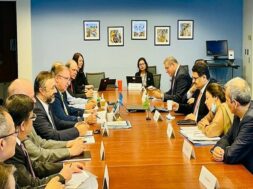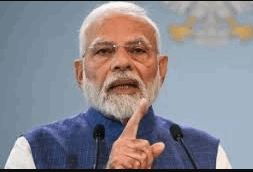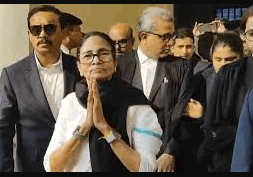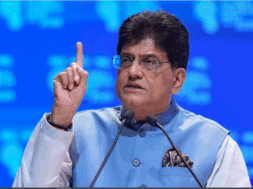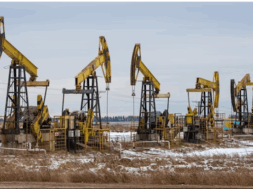
Pakistan: IMF Team to Discuss Aids to Bail it Out of Worst Economic Crisis
Manas Dasgupta
NEW DELHI, Jan 31: A team from the International Monetary Fund (IMF) arrived in Islamabad on Tuesday to discuss the ninth review of the $7 billion Extended Fund Facility as Pakistan was gripped by what is being called its ‘worst-ever economic crisis’ since independence with the rupee plummeting, inflation soaring and energy in short supply.
According to a Pakistani television broadcast citing the sources, Pakistan and the IMF will hold technical talks for the first four days, wherein economic data from different departments will be reviewed.
Earlier, the international fund organization’s Resident Representative for Pakistan Esther Perez Ruiz said: “At the request of the authorities, an in-person Fund mission is scheduled to visit Islamabad [from] January 31 to February 9 to continue the discussions under the ninth EFF review.”
Pakistan is expecting to discuss with the IMF team a vital cash injection. Notably, Pakistan has been hit by the worst economic crisis, grappling with decades-high inflation, lower GDP growth, and depleting forex reserves. The country is desperately looking for funds from the IMF to avoid default.
Pakistan’s currency plummeted to a record low of 270 against the US dollar as the government surrendered its control over the exchange rate in order to meet the demands of the IMF for a bailout.
“We’re at the end of the road. The government has to make a political case to the public for meeting these (IMF) demands. If they don’t, the country will certainly default, and we’ll end up like Sri Lanka, which will be even worse,” an expert Pakistani economist said.
Prime Minister Shehbaz Sharif for months held out against the tax rises and subsidy slashing demanded by IMF fearful of backlash ahead of elections due in October. But in recent days, with the prospect of national bankruptcy looming and no friendly countries willing to offer less painful bailouts, Islamabad has started to bow to pressure.
The government loosened controls on the rupee to rein in a rampant black market in US dollars, a step that caused the currency to plunge to a record low. Artificially cheap petrol prices have also been hiked. Sri Lanka defaulted on its debt last year and endured months of food and fuel shortages that sparked protests, ultimately forcing the country’s leader to flee overseas and resign.
In Pakistan, time is of the essence, with Nasir Iqbal from the Pakistan Institute of Development Economics warning the economy had already “virtually collapsed” due to mismanagement and political turmoil, a nation in panic, still reeling from unprecedented floods that submerged a third of its territory.
The world’s fifth-biggest population has less than $3.7 billion in the state bank — enough to cover just three weeks of imports. It is no longer issuing letters of credit, except for essential food and medicines, causing a backlog of thousands of shipping containers at Karachi port stuffed with stock the country can no longer afford.
Industry has been hammered by the imports block and massive rupee devaluation. Public construction projects have halted, textiles factories have partially shut down, and domestic investment has slowed. In downtown Karachi, dozens of day labourers including carpenters and painters wait with their tools on display for work that never comes.
“The number of beggars has increased and the number of labourers has decreased,” said 55-year-old mason Zafar Iqbal. At the petrol pump, a widow with her son said every few hundred rupees (75 cents) of fuel for their motorcycle was precious, with the pair only eating two meals a day. “The cost is so high that we eat our breakfast late and the second meal at around seven, with nothing in between,” said Ulfat.
Pakistan is locked in an endless cycle of servicing external debt. State Bank Governor Jamil Ahmed last month said the country owed $33 billion in loans and other foreign payments before the end of the fiscal year in June. A diplomatic offensive has seen $4 billion rolled over by lending nations, with $8.3 billion still on the negotiating table.
Meanwhile, Pakistan is battling severe energy shortages — with capacity drained by poor infrastructure and mismanagement — compounding the misery of businesses and citizens. Last week, the whole country was plunged into a day-long blackout because of a fault in the national grid that followed a cost-cutting measure.
State petroleum minister Musadik Malik told reporters in Islamabad that imports of Russian oil would start in April, paid for in currencies of “friendly countries” in a mutually beneficial deal. The tumbling economy mirrors the country’s political chaos, with former Prime Minister Imran Khan heaping pressure on the ruling coalition in his bid for early elections while his popularity remains high.
Mr Khan, who was ousted last year in a no-confidence motion, negotiated a multi-billion-dollar loan package from the IMF in 2019. But he reneged on promises to cut subsidies and market interventions that had cushioned the cost-of-living crisis, causing the programme to stall.
It is a common pattern in Pakistan, where most people live in rural poverty, with more than two dozen IMF deals brokered and then broken over the decades. “Even if Pakistan avoids default, the underlying structural factors that triggered the current crisis — one exacerbated by poor leadership and external global shocks — will still be in place,” tweeted political analyst Michael Kugelman, the director of the South Asia Institute at the Wilson Center in Washington. “Barring difficult, large-scale reforms, the next crisis could be just around the corner.”
Earlier, Pakistan entered a $6 billion programme in 2019 but later on, it increased to $7 billion. If everything goes well then the international organization would release $1.8 billion, which is still pending.
The IMF team visit had earlier been put off for two months due to the Pakistan Muslim League-N-led government’s unwillingness to accept certain conditions placed before it by the IMF, and the disagreements have yet to be resolved. However, Sharif has now indicated that the government was finally ready to swallow the bitter pill of the IMF’s “stringent” conditions to revive the loan programme.
In the statement, Ruiz said the mission would focus on policies to restore domestic and external sustainability, including strengthening the fiscal position with durable and high-quality measures while supporting the vulnerable and those affected by the floods; restoring the viability of the power sector and reverse the continued accumulation of circular debt; and re-establish the proper functioning of the foreign exchange market, allowing the exchange rate to clear the forex shortage.
“Stronger policy efforts and reforms are critical to reduce the current elevated uncertainty that weighs on the outlook, strengthen Pakistan’s resilience, and obtain financing support from official partners and the markets that is vital for Pakistan’s sustainable development,” Ruiz said.
Recent media reports indicated that with Pakistan Finance Ministry being unable to furnish tenable answers for the IMF to commence formal negotiations on the 9th review, it may delay the release of funds from the IMF. The IMF visit to Pakistan scheduled for October was deferred because of differences between Pakistan’s commitments to the IMF on fiscal consolidation. “Pakistan and the global lender continued talks virtually but differences still persisted over tax collection targets, and non-starter energy reforms including hiking of gas tariff, rising circular debt, and expenditure overrun, making consensus harder to strike on a staff-level agreement for completion of the review,” media reports said.
The weekly food inflation has also increased by nearly 31% compared to last year, which, combined with the shortage of foreign exchange, is making it very hard for people to afford basic necessities such as food and energy. The Pakistan Prime Minister has also formed a National Austerity Committee (NAC) to suggest ways to lower the cost expenditures of various departments. The committee has proposed a 10 per cent salary cut for government employees and a 15 per cent cut in expenditures of ministries and divisions.
